Britain’s Housing Crisis Hit A New Low
29 Aug 2019
Britain's Housing Crisis
Rent affordability continues to decline in most parts of the country. The highest rate of unaffordability has been reported in North-East London, the area of Ilford, Dagenham, and Romford. In 2016, almost 30 per cent of the homes with the one-and two-bedroom house were affordable, but now the affordability has declined to less than 2%.
London housing allowance is almost £50 a week less than the affordable rate, while the number of people approaching social housing help increased by almost 200% in Barking and Dagenham council.
According to the official data of 2018 released by the London Councils, not even one of the single rooms available for private rent in large part of London, in the areas of Feltham and Hanworth, was affordable for people relying on local UK housing allowance. Similarly, there were no rooms in the southern greater Manchester, including Stockport and Wythenshawe.
There has been a sharp fall in affordability as the rents continue to increase in the last three years. It has resulted in homelessness and child neglect as the families are trying to fulfil the essentials like food and rent.
LHA is dependent on 1.2m households for private renting, but the number of homes has frozen since 2016, and it is expected to remain frozen till 2020 due to welfare cuts. As a result, many face homelessness in the UK due to a sharp fall in affordability as the private rents continue to rise.
Economic Factors Affecting the Housing Market
Experts believe the housing crisis is affecting the economy and damaging the people struggling to maintain employment while living in temporary accommodation. A group of MPs attacked the government for prolonging the crisis by restricting land sales to build affordable homes and social housing.
The TV presenter George Clarke said, "this was a crisis", and criticised the government for not constructing new homes. Those living in private rented homes pay almost 40 per cent of their earnings towards rents, forcing them to spend up to 80% of the income on rents till their retirement, assuming the rents are rising at the same rate as earnings.
Experts believe in the current situation, 52% of the pensioners will be paying for private rent, more than 40% of their earnings on their rent in the next 20 years, which also indicates almost 630,000 millennials will not be able to earn to own a house.
This generation will remain homeless and have no choice but to move to social housing or temporary rental accommodations offered by the state. The number of people living in private rented accommodations at over 64% will be three times in the next three decades.
People living in unsuitable private rented homes will grow more than four times in the next 25 -30 years. Many blame the previous homeowners and pensioners for owning large homes and creating restrictions for the baby boomers and the millennials. Experts believe there is a need to change the policies to handle such a shortage.
For new opportunities in the UK real estate markets, click Hamilton International Estates (www.hamiltoninternationalestates.com).
Categorised in: All News












